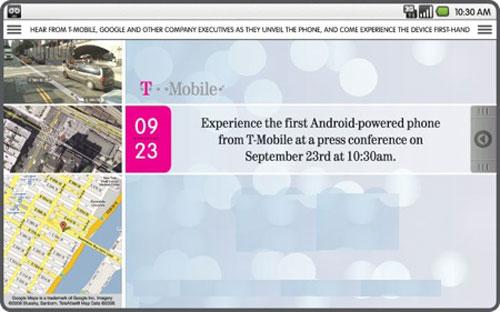T-Mobile sets stage for Android, iPhone showdown next week
An invitation sent out on Tuesday by T-Mobile asks the media to gather next week to see the first phone built on the Android mobile platform, but will also pit Apple and Google against each other — if reluctantly.
While little else is contained in the release itself, a string of leaks have essentially spoiled the carrier's plans in advance and imply a direct competitor to the iPhone and other full-touchscreen cellphones.
Once known as the HTC Dream, the device to eventually be called the G1 under T-Mobile has actually been in the public eye in Google demonstrations almost since Android's public unveiling last year. The device has garnered attention through photos and other leaks for the sheer number of features claimed to be under its wing: on top of its touchscreen, the display will slide out like Danger's Sidekick to expose a full keyboard and carry a BlackBerry-like trackball.
As is increasingly becoming the norm for user-friendly smartphones, the G1 is also reputedly packed with features. Some reports have the inaugural Android handset launching T-Mobile's 3G network on a national level, while numerous sources have also pegged GPS navigation, a tilt sensor and Wi-Fi to the device.
T-Mobile's invitation to journalists for the Android event. | Image credits: Gearlog.
Just hours before T-Mobile's invite hit the wires, the Wall Street Journal went so far as to claim sources that reported a late-October release for the HTC-made Android phone, tentatively removing one of the last pieces of the puzzle for the special announcement.
Whatever hardware is showcased at the high-profile occasion, it's likely to be the software that creates the most tension. The touchscreen version of Android has been been compared repeatedly to the iPhone despite significant alterations over its ten months of public appearances and even included the introduction of a close parallel to the iPhone's App Store known as Android Market.
Most differences in code have instead been a matter of policy. Where Apple has imposed a non-disclosure agreement on iPhone developers, limited their hardware access and pulled apps from the App Store for controversial reasons such as competition, Google has insisted on a primarily open-source approach that takes its hands off of much of the development process; developers can not only share code but are even allowed to access components that would normally be off-limits, such as the phone dialer.
And though Apple and Google are ostensibly close allies that share software technology, the tensions created by Android have also had a small impact in Apple's board room, with Google chief and Apple board member Eric Schmidt having to leave meetings as the company discusses iPhone plans that might conflict with Android's strategy.
Still, the Mountain View, Calif.-based search giant has been confident enough to demo a virtually complete Android on a G1 at a London developer meetup just a week before T-Mobile's event and argued that the quality and accessibility of Android apps would carry the day even if hardware is the same, particularly against legacy smartphone platforms such as Windows Mobile.
An excerpt of that demo is available to watch below.
 Aidan Malley
Aidan Malley














 Amber Neely
Amber Neely
 Thomas Sibilly
Thomas Sibilly
 AppleInsider Staff
AppleInsider Staff
 William Gallagher
William Gallagher
 Malcolm Owen
Malcolm Owen
 Christine McKee
Christine McKee










94 Comments
The difference is that Apple is both the software and the hardware vender. Apple needs their handset approved by the cell networks. Google doesn't have that concern. They just build the sandbox and it's up to the hardware makers to pick and choose which features get implemented.
Sweet stuff, hopefully I'll be able to get the G1 for use on the AT&T network.
The number one reason for the iPhone's tremendous popularity, imho, is the iPhone's incredibly easy-to-use interface. The iPhone made is supremely easy to use features like web browsing and email that were already offered on other smart phones but were rarely used because of poor implementation. This is how the iPhone changed everything. T-Mobile's Android phone cannot beat the iPhone by offering a longer list of features. If it is harder to use, it will fail.
The number one reason for the iPhone's tremendous popularity, imho, is the iPhone's incredibly easy-to-use interface. The iPhone made is supremely easy to use features like web browsing and email that were already offered on other smart phones but were rarely used because of poor implementation. This is how the iPhone changed everything. T-Mobile's Android phone cannot beat the iPhone by offering a longer list of features. If it is harder to use, it will fail.
RDF much?
How come the iPhone in Japan is barely taking off the ground? The people I talk with think the iPhone is passé at this point. It really is just another cellphone. Get used to it. Most other manufacturers have already caught up or are catching up and surpassing the iPhone.
Don't dismiss the features of the new phones. Apple could certainly learn a thing or two from them.
This is good. This will push Apple to improve the current and future iPhone by adding more features and better components.